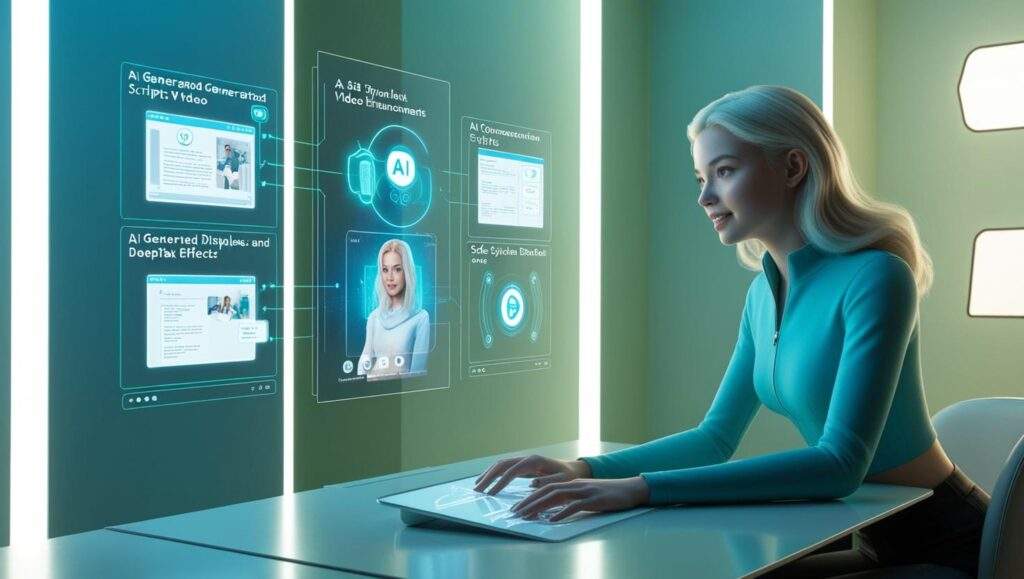
Introduction
Artificial intelligence (AI) is reshaping the media and entertainment industry, revolutionizing how content is created, personalized, and distributed. From AI-generated music and video editing tools to personalized recommendations and deepfake technology, AI is making content more engaging, efficient, and accessible.
But how exactly is AI driving these changes, and what does it mean for creators, consumers, and the industry as a whole? Let’s explore the key ways AI is transforming entertainment.
1. AI in Content Creation: Automating and Enhancing Creativity
AI-powered tools are assisting creators by automating tedious tasks while also introducing new ways to generate content.
How AI Enhances Content Creation:
- AI-generated scripts and articles streamline writing processes.
- AI-powered video and audio editing tools improve production efficiency.
- Deep learning models create realistic AI-generated images, voices, and animations.
Why It Matters:
- Reduces production time and costs for content creators.
- Expands creative possibilities with AI-assisted generation.
- Enables hyper-personalized content for audiences.
Example:
- Runway ML provides AI-powered video editing and special effects automation.
- Jasper AI helps marketers and writers generate AI-assisted content.
2. AI in Personalization: Smarter Recommendations and Targeted Content
AI algorithms analyze viewer preferences and behaviors to personalize content recommendations.
How AI Enhances Personalization:
- AI-driven recommendation engines suggest content based on user behavior.
- AI-powered ad targeting increases engagement and relevance.
- Automated subtitles and translations improve content accessibility.
Example:
- Netflix uses AI to recommend personalized shows and movies based on viewing habits.
- YouTube’s AI algorithm suggests videos tailored to user interests.
3. AI in Special Effects and Deepfakes: Transforming Visual Storytelling
AI is pushing the boundaries of visual effects, creating hyper-realistic content that enhances storytelling.
How AI Enhances Special Effects:
- AI-generated CGI and deepfake technology enable ultra-realistic effects.
- AI-powered animation streamlines motion capture and character modeling.
- Neural networks enhance video quality with AI-driven upscaling and restoration.
Example:
- Deepfake technology was used in The Mandalorian to recreate a younger version of Luke Skywalker.
- Topaz AI uses AI to upscale old film footage for remastering.
4. AI in Journalism and News Reporting: Faster Content Generation
AI-driven automation is changing the way news is gathered, written, and distributed.
How AI is Reshaping Journalism:
- AI-powered bots generate news articles based on real-time data.
- Automated fact-checking tools identify misinformation.
- AI-driven voice synthesis enhances audio journalism and podcasts.
Example:
- The Associated Press uses AI to automate financial news reporting.
- Reuters’ AI-powered Lynx Insight assists journalists with data-driven reporting.
5. Challenges and Ethical Concerns of AI in Entertainment
Despite AI’s benefits, it also raises concerns about authenticity, misinformation, and content ownership.
Key Challenges:
- Deepfake misuse can lead to misinformation and fraud.
- AI-generated content raises legal and ethical ownership issues.
- Algorithm-driven content recommendations may create filter bubbles and biases.
Example:
- Concerns over AI-generated deepfakes being used in misinformation campaigns.
- AI-created music and art sparking legal debates over copyright ownership.
For more insights into ethical concerns, read our article on The Hidden Costs of AI.
Conclusion: AI is Reshaping Media & Entertainment
AI is driving innovation in content creation, personalization, and storytelling, making entertainment more dynamic and accessible. However, the ethical concerns surrounding AI-generated content must be addressed to ensure responsible use.
What Do You Think? Do you see AI as a tool for creative enhancement or a potential threat to originality in entertainment? Share your thoughts in the comments!

